

by John Helmer, Moscow
@bears_with
The last people to say they saw Sergei and Yulia Skripal together were two medical staff members at Salisbury District Hospital. The first was Senior Sister Sarah Clark, who was in charge of the evening shift at the Salisbury hospital’s Intensive Care Unit; the second was Dr Stephen Davies, a consultant in the Emergency Department of the hospital.
According to the British Government, the two Skripals were attacked by a chemical nerve agent in the centre of Salisbury at about 4:15 on the afternoon of Sunday, March 4, 2018, then rushed by ambulance to the Salisbury hospital. The nerve agent was reported later – at least thirty-six hours later, perhaps longer – to have been identified by the Defence Science and Technology Laboratory at Porton Down as an organophosphate chemical warfare agent called Novichok produced in Russia. The British Government’s version of what happened is that the nerve agent was despatched from Moscow with assassins of the Russian military intelligence agency GRU. Two men have been named and publicly accused by British prosecutors with attempted murder and other crimes.
The Skripals survived the alleged attack, and have recovered from its medical effects. Public releases by the hospital claim Yulia Skripal was released on April 9, 2018; her separation from her father was confirmed thereby. Sergei Skripal was reportedly released from hospital on May 18. In two subsequent telephone calls Yulia made to her cousin and grandmother in Russia, and in a brief televised statement filmed by the US news agency Reuters on May 23, she referred to her father’s medical recovery, but did not say he was living with her. The Reuters film was recorded in a parkland corner of the Royal Air Force base at Fairford, north of Salisbury. The base is run by United States Air Force intelligence and bomber staffs.
Yulia’s last telephone contact with her family in Russia was on July 24, 2018. She has not been heard from since.
Sergei Skripal has been recorded in three brief telephone calls to his niece’s and mother’s home in Yaroslavl; they took place on April 4, 2019; May 9, 2019; and June 26, 2019. Only the May 9 call has been broadcast by the Russian media; it lasted for less than 30 seconds. Sergei did not mention Yulia nor did he say he was living with her. He has been incommunicado since June 26, 2019.
Describing her role in treating the Skripals at Salisbury Hospital, Clark gave an interview to the BBC which was broadcast on May 30, 2018. Contacted at the Radnor Ward Intensive Care Unit this week, Clark now refuses to confirm she had personally seen the two Skripals at the hospital following their admission, claiming she is “not allowed to give any information”.
Two years ago Davies was working at the Emergency Department of Salisbury Hospital when the Skripals were admitted. Days later he wrote a letter to The Times newspaper reporting what he claimed then were the circumstances. Davies continues his work in the Emergency Department, and was contacted there this week. He now refuses to answer any question about the Skripals.
The British Government has prevented the Skripals from speaking publicly or testifying in court to what they believed had happened to them. Their whereabouts are secret.
When the hospital staff witnesses are no longer sticking to their eyewitness testimony, then everything which has followed, including press statements from the hospital, the Metropolitan Police in London, and two court records – one from the Court of Protection of the High Court in London, and one from the Wiltshire and Swindon Coroner’s Court in Salisbury – can no longer be taken as credible evidence in the case.
Not only have the Skripals disappeared into a form of British immuration, but they have also been separated from each other. This exceptional isolation is fresh evidence that the official narrative of the Skripal case is false, and that the Skripals are being held, not for their protection by the British from the Russians, but in punishment and solitary confinement.
This is an investigation of one telltale point in the Skripal affair – when was the last time eyewitnesses claim to have seen Sergei and Yulia Skripal together. The story so far can be followed in this book, Skripal in Prison, released last month.
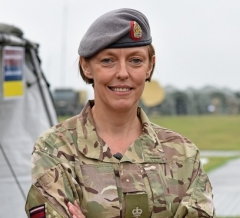
Dossiers of every eyewitness record of the events in the Salisbury town centre on the afternoon of March 4, 2018, have been compiled by Liane Theuerkauf and Carol Hayward. According to Theuerkauf’s count, sixteen individuals have testified to seeing the Skripals together at the point of their collapse, or in the moments afterwards, before they were evacuated to hospital. These eyewitnesses gave their names and accounts to press reporters who have published what they say they saw. One of the 16 witnesses, Alison McCourt (right), was identified later as a colonel, the Chief Nursing Officer of the British Army, and a chemical warfare specialist; her role was revealed by her daughter Abigail. Read the details here.
The count of 16 does not include official eyewitnesses at the scene – at least three local Wiltshire police officers and at least two paramedics.
The dossier of Carol Hayward identifies the large number of Closed Circuit Television (CCTV) cameras operating in the public areas and also in the surrounding shops, restaurants, public house, and a fitness gym, which recorded the Skripals moving together to the fateful moment. A local broadcaster has reported that “at least five” CCTV cameras operated by the Salisbury city council were trained on the point of their collapse. Hayward’s dossier counts at least three CCTV cameras operating in surrounding shops; an uncounted number at the restaurant where the Skripals had a lunch together; and 12 at the pub where they ordered drinks.
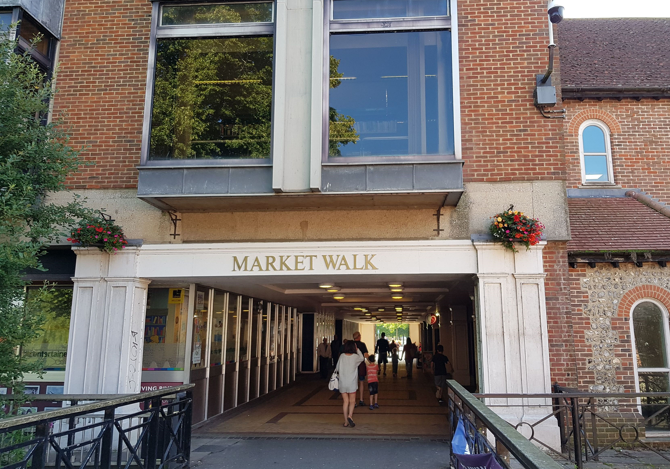
A Salisbury city council CCTV camera (upper right) at the passage to the bench where the Skripals reportedly collapsed. Source: https://www.spirefm.co.uk
A video reconstruction of the walkway towards the bench can be watched here.
All of the CCTV footage has been confiscated by the police and not returned. No image of the Skripals together has been published in the past two years.
In elapsed time, the next eyewitness to be reported as seeing the Skripals together was the nurse in charge at the intensive care unit of the hospital, upstairs from the ground-floor emergency entrance, after their admission. This was Sarah Clark. “I was the senior nurse in charge of the shift the evening that Yulia and Sergei were admitted,” she told the BBC. In this excerpt, Clark is recorded speaking for 50 seconds to a reporter named Mark Urban on May 30, 2018. The full broadcast can be viewed here. For analysis of what Urban revealed inadvertently, read this.
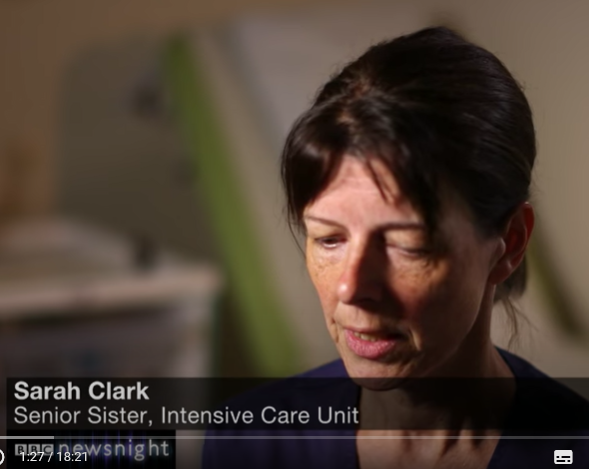
Source: https://www.youtube.com
Urban later reported himself to have been collaborating on the official narrative of the Skripal case with the British Secret Intelligence Service (MI6) and with the NATO propaganda unit Bellingcat. Clark’s 50-second testimony has been cut and edited four times. Urban refuses to answer questions.
Clark is recorded by the BBC as confirming the separation of the two Skripals following Yulia’s release from hospital. She told Urban that Sergei Skripal “would have wanted to be discharged earlier if he could have been. But he recognized, you know, that there were ongoing issues that needed to be addressed. And he was very dignified and accepted the advice that was given to him by the medical team. And you know, waited until, obviously, you know, he knew that, you know, that when it was time for discharge that, umm, he needed to be ready to go.”
Clark was contacted for a fresh interview to clarify her identification of the two Skripals at the hospital and details of their treatment together, and then apart. How did you know who the Skripals were? she was asked by telephone. Did you recognize them from their pictures in the media? “I can’t give you, I can’t answer any questions,” Clark said. “We are not allowed to give any information.”
The second eyewitness at the hospital to have publicly testified after the Skripals were admitted was Dr Stephen Davies.
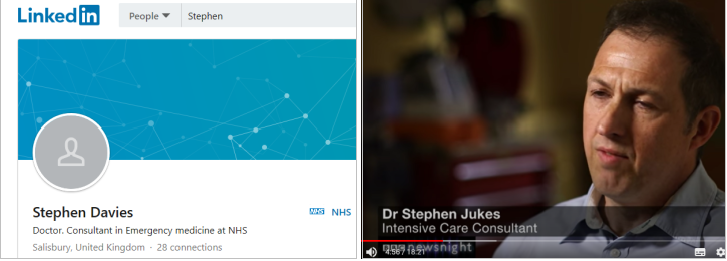
Left: an internet profile of Dr Stephen Davies, confirming his current employment at the Emergency Department (ED) of Salisbury Hospital. He was telephoned at the department and at his hospital office extension over the past weekend. He was also emailed at his NHS address. Urban’s BBC film did not interview Davies. Right: Urban interviewed instead Dr Stephen Jukes, a consultant at the hospital's Intensive Care Unit.
On March 16, 2018, a letter from Davies was published in The Times in which he said: “Sir, Further to your report (“Poison Exposure Leaves Almost 40 Needing Treatment”, Mar 14), may I clarify that no patients have experienced symptoms of nerve-agent poisoning in Salisbury and there have only ever been three patients with significant poisoning. Several people have attended the emergency department concerned that they may have been exposed. None had symptoms of poisoning and none has needed treatment. Any blood tests performed have shown no abnormality. No member of the public has been contaminated by the agent involved.”
Davies was attempting to correct a report by the newspaper’s “crime and security editor”, published on March 14. This claimed: “Nearly 40 people have experienced symptoms related to the Salisbury nerve agent poisoning, it was revealed yesterday, as locals expressed anger about a lack of information from the authorities. Sergei Skripal, a former Russian double agent who sought refuge in Britain after a spy swap in 2010, and his daughter Yulia are among 38 people who required hospital treatment for poisoning symptoms, Neil Basu, the national head of counterterrorism, revealed. Only the Skripals, who are in a very serious condition, and Detective Sergeant Nick Bailey, who is making good progress, are still in hospital. One person who is not showing symptoms is being seen as an outpatient.”
Davies intended to correct the lead phrase, “nearly 40 people”. His published text said there had been “no patients [with] symptoms of nerve-agent poisoning” and only “three patients with significant poisoning”. Davies was implying that three patients he had been treating directly were the two Skripals and Bailey the policeman; and that he was ruling out they were victims of nerve-agent poisoning. This was more than a week after March 6, the date when, Salisbury Hospital management and staff subsequently told Urban, nerve-agent poisoning had been confirmed by the Porton Down laboratory.
Several months later Davies was contacted by Rob Slane of The Blogmire and asked to clarify what he meant to say. On July 16, 2018, Slane reported Davies had replied that “The Times edited his letter, and that this produced a misleading message. Furthermore, he confirmed to me that the three patients mentioned in his letter ‘were poisoned with a nerve agent, confirmed by blood tests and symptoms.’” “I guess that clears that point up”, Slane concluded.
But did it?
MAP OF SALISBURY DISTRICT HOSPITAL
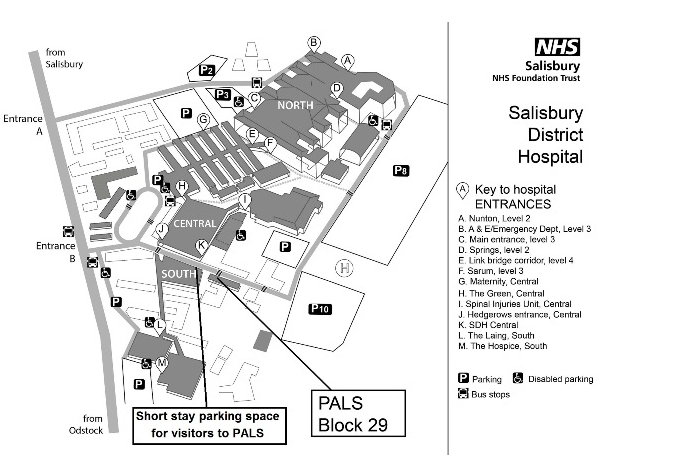
The ambulance route for emergency admissions to the hospital is at Entrance A (top left) and the Emergency Department is at the top of the ramp, marked at B. Dr Stephen Davies is assigned there. Senior Sister Sarah Clark is assigned to the Intensive Care Unit (ICU); this is located in the same building, North, on the fourth floor; it is known as Radnor Ward. Access is by lift up one level from the Emergency Department. At the time of the March 4, 2018, incidents the ICU ward had 8 beds with 4 side rooms. For map, department and ward particulars, see this. In a BBC film broadcast on November 22, 2018, Nicholas Bailey, the local policeman reportedly admitted to the hospital on March 6 with what Davies initially called “significant poisoning”, said: “one of the Skripals was being treated in the room next door, which he said was guarded by police.” Bailey did not claim both Skripals were in the ward together when he was treated there. He also told the BBC: “"I was conscious throughout the whole time." The BBC also reported: “Det Sgt Bailey has never met Sergei and Yulia Skripal.” For Bailey’s script and analysis, click.
Davies was reached by telephone at the Emergency Department (ED) at Salisbury Hospital last Saturday, April 18. He had just left the ED floor and was heading for his office, an ED source said. At his office, however, he did not pick up his telephone. He had left for the day, another staff member said. Davies was then sent an email at his official NHS address.
He was asked five questions: “1. In your use of the phrase ‘three patients with significant poisoning’ were you confirming their identification as widely reported, and can you now reconfirm that identification? Your answer, yes or no, will be appreciated. 2. In subsequent emails in which you clarified the editing of the letter, you continued to refer to ‘three patients’; you did not identify them by name. Can you confirm their names now as your reference has been generally understood to be to Sergei Skripal, Yulia Skripal, and Nicholas Bailey? Your answer, yes or no, will be appreciated. 3.Was the basis you used for your identification of the three direct or indirect — your direct sight of the three patients in the hospital? Your engagement with the patient files with names displayed? Your answer, direct or indirect, will be appreciated.
4. In your letter you said: ‘No member of the public has been contaminated by the agent involved’. What did you mean by ‘no member of the public’? Did your phrase mean to distinguish between policemen and non-policemen? Your answer, yes or no, will be appreciated.
5. Is it your understanding that Sergei and Yulia Skripal were, or were not, ‘members of the public’?”
Davies did not respond over twenty-four hours, and so a follow-up email was sent requesting his reply. He was advised that if he did not reply substantively, he would be reported as refusing to reply. Davies refuses to answer.
In Urban’s BBC broadcast, two other ICU doctors at the hospital gave testimony – Dr Duncan Murray, the clinical director, and Dr Stephen Jukes. Murray is a surgeon; Jukes an anaesthesiologist; according to the hospital, at the Intensive Care Unit Jukes’s specialization is “Organ Donation Lead, Mortality, Educational Supervisor”. Neither Murray nor Jukes told the BBC he had directly seen the Skripals, or treated them personally. Jukes told Urban: “The clinical decisions were ours. But we would be foolish not to take their [Porton Down’s] advice, which we did.”
Murray and Jukes were contacted and asked: “1. In your BBC interview of May 2018, you did not explicitly confirm that the patients you were treating in ICU for nerve-agent poisoning were Sergei and Yulia Skripal, and Nicholas Bailey. Can you now confirm that identification? Your answer, yes or no, will be appreciated. 2. Was the basis you used for your identification of the three direct or indirect — your direct sight of the three patients in the hospital? Your engagement with the patient files with names displayed? Your answer, direct or indirect, will be appreciated.”
Neither doctor has answered.
A fourth witness at Salisbury Hospital wasn’t exactly an eyewitness. This was Detective Sergeant Nicholas Bailey of the Wiltshire Police. He was first admitted to the hospital on March 6 and was released on March 22. In an interview with the BBC, broadcast on November 22, 2018, Bailey said he had been “conscious throughout the whole time.” He was a direct witness, he told the BBC, that “one of the Skripals was being treated in the room next door, which he said was guarded by police.” Bailey has never said publicly which of the Skripals, Sergei or Yulia, was in the room next to his, or what he knows of the whereabouts of the other Skripal. Here is the BBC broadcast report.
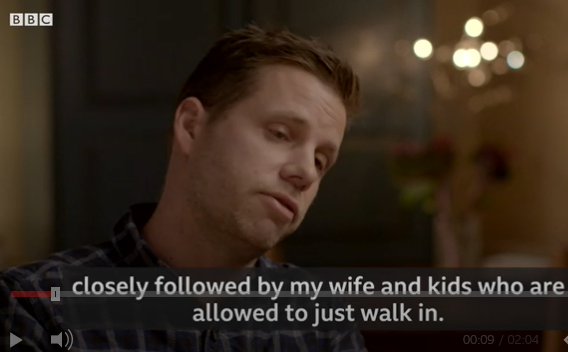
Excerpt of BBC interview with DS Bailey, November 22, 2018. Bailey says the nurse bringing him his meals was also serving one of the Skripals in the adjoining room and was in full protective costume. Bailey’s wife and children followed into his room without protection.
The Radnor Ward witness discrepancies have not been reported before. Nor is there an official or witness explanation for the difference between what Bailey said he saw in the ward at the hospital; what the nurse and the three doctors claim they witnessed; what the hospital and press announced officially at the time; and what Clark, Davies, Murray and Jukes now refuse to clarify.
At least one Skripal was missing and unaccounted for as early as March 22.
That is despite evidence given on oath by one of five witnesses in the London Court of Protection hearings on March 20-22, 2018. That one witness was from Salisbury Hospital. He was identified as “ZZ Treating Consultant” in the court judgement by Justice David Williams, released on March 22, 2018. Read it in full here.
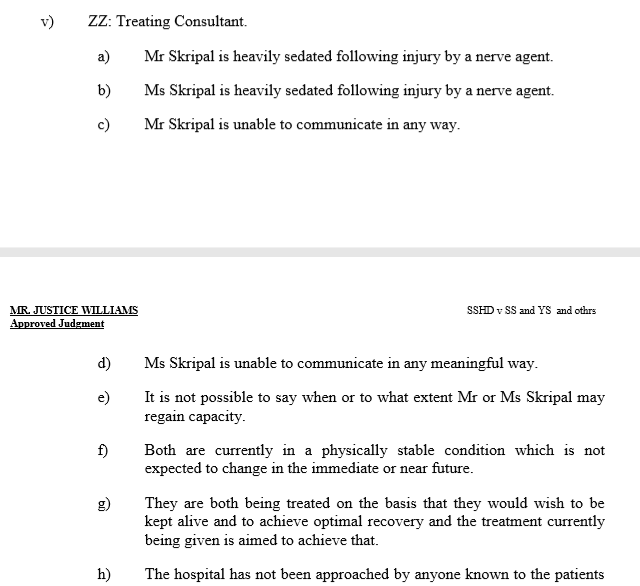
The court ruling also reports two other bits of the doctor’s testimony in court. “ZZ is of the opinion that it will be unlikely to adversely effect their clinical condition… ZZ’s point that disclosure of medical records should only go so far as is necessary and this will cover disclosure from the period 4 March 2018…” Source: https://www.judiciary.uk/
Six consultant doctors were assigned to the Radnor Ward ICU in March 2018; they remain still. Only two, Murray and Jukes, have publicly identified themselves as engaged in the Skripal case. One of them gave sworn court testimony about the location and medical condition of the Skripals which Bailey’s subsequent statement about the ward occupancy puts in doubt. ZZ, the treating consultant’s testimony included the prognosis that the comatose condition of Sergei and Yulia Skripal “is not expected to change in the immediate or near future.”
This has been contradicted by subsequent statements of Yulia Skripal and hospital staff; they indicate she became conscious and began talking between March 18 and 24. Jukes told the BBC in the broadcast of May 30: “I think we’d all agree that we were exceptionally surprised, pleasantly surprised to see the recovery happen – and at such a pace when it did begin to happen. That I can’t easily explain.”
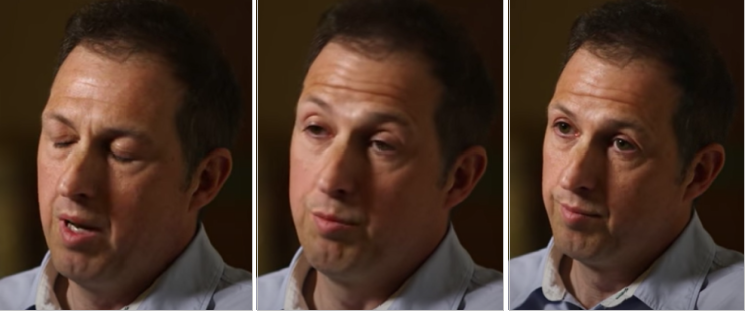
Left to right, Stephen Jukes speaking to the BBC in May 2018: “Exceptionally surprised” – Min. 9:28; “at such a pace”, Min. 9:32; “I can’t easily explain” – Min. 9:34. Source: https://www.youtube.com/
Jukes was pleading his case to explain the contradiction with his London court testimony two months before.
Another direct witness at Salisbury Hospital ought to have been one or more technicians from the Organisation for the Prevention of Chemical Weapons (OPCW), who were authorized by Justice Williams’s court order to collect blood samples from the Skripals for later testing in OPCW laboratories. The OPCW issued its report on its sampling of “three hospitalized individuals” in Salisbury on April 12, 2018.
To do this, the OPCW despatched a team of individuals, who arrived on March 19, before the court hearing began in London. Read the unclassified public version of the OPCW report here.

Source: https://www.opcw.org/
The report says the OPCW team visited the Skripals and Bailey to confirm their identities in Salisbury Hospital where blood samples were also taken. “The team was able to collect blood samples from the three affected individuals under full chain of custody for delivery to the OPCW Laboratory and subsequent analysis by OPCW designated laboratories, and conducted identification of the three individuals against official photo-ID documents.”
This matching of three patients by name and face to “official photo-ID documents” appears to be confirmation which Clark, Davies, Murray and Jukes are refusing to provide. The OPCW report also implies the two Skripals were together when the OPCW visited between March 21 and 23, possibly after Bailey had left the ward and been discharged from hospital.
Before his departure, Bailey’s testimony to the BBC revealed an unusual detail of the police operation under way at the time. “One of the Skripals was being treated in the room next door,” Bailey remembered, “which he said was guarded by police.” Radnor Ward has only one entrance from the main hospital corridor. Bailey did not say the police post was at that entrance. Instead, by placing the police inside the ward but outside the door of the Skripal room, Bailey revealed the police were positioned, not to protect the ward from alleged Russian assassins breaking in, but to prevent Skripal from breaking out.
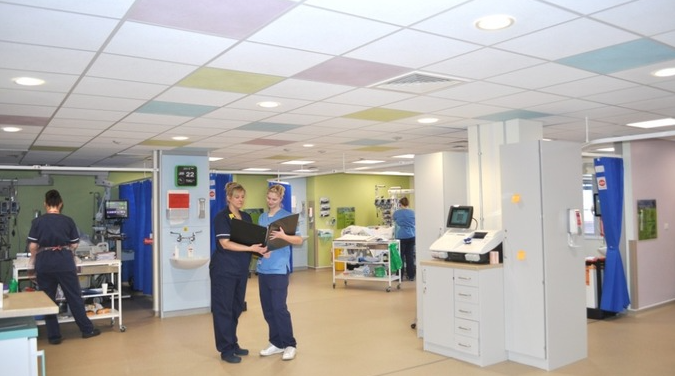
Layout of central control area of the Radnor Ward Intensive Care Unit after its most recent refurbishment in 2015.
There are no Russian eyewitnesses to what happened to the Skripals. But there are witnesses to Yulia’s telephone call of April 5, 2018; her video film on May 23; and her final call on July 24, 2018. The first call from the hospital, lasting less than 30 seconds on what she called a “temporary telephone”, was broadcast on Russian television, and a transcript published in English. Yulia mentioned her father in passing: “He’s resting now, having a sleep.”
Her Reuters film appearance, during which she read a prepared Russian text, lasted 115 seconds. Her references to her father did not say they were living together, where or in what conditions. Forensic analysis of the audio tape indicates no voice distortion that is usually an after-effect of the tracheostomy she had reportedly undergone at the hospital.
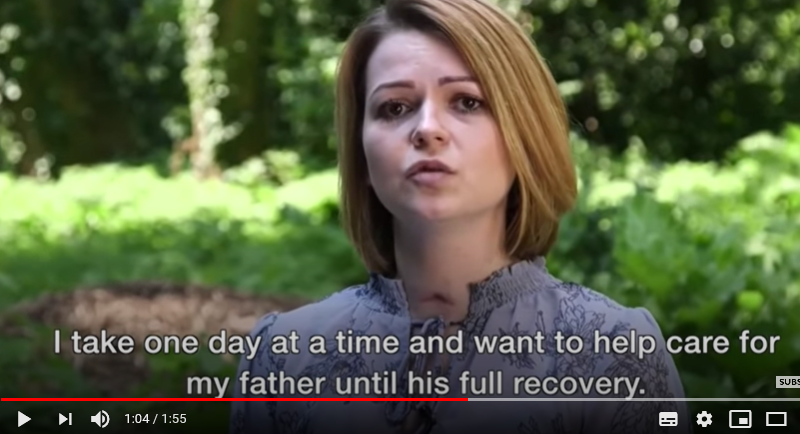
Note the visible indentation and scar of an apparent tracheostomy. Source: https://www.youtube.com/
As for corroborating evidence of her time in hospital, after Yulia confirmed she was conscious but before Salisbury Hospital announced her release, she did not sign a consent form for her treatment, as NHS regulations and British law required.
Yulia’s final telephone call to her cousin Viktoria and grandmother Yelena on the latter’s birthday, July 24, 2018, was reported in the Russian press. According to quoted excerpts, she said “her father could not talk because he still had a tracheostomy [tube]. It will be removed in three days [July 27, 2018], and he will call, but now he is wheezing heavily and [his voice] will not be heard.” That was Yulia Skripal’s last reported contact with her family. As is now known, Sergei Skripal did not make his first telephone contact until nine months later.
Five Russian reporters have specialized in investigating the Skripal case, analyzing the tapes, and interviewing Viktoria Skripal. They are Lev Speransky and Ekaterina Sveshnikova of Moskvosky Komsomolets; Vladislav Zuevsky and Nikolai Pozdnyakov of Izvestia; and Alexander Ogorodnikov of TV Centre. Each was asked this week to say when was the last time Sergei and Yulia Skripal were together. They all refuse to answer.











Leave a Reply